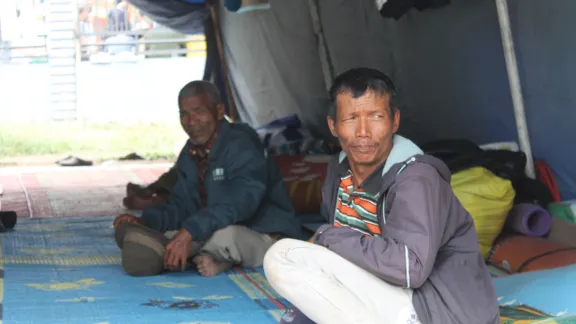
Displaced Karo land inhabitants at the Kabanjahe evacuation center in North Sumatra. Photo: HKBP/Fernando Sihotang
Lutheran Churches Assist Mt Sinabung Evacuees
(LWI) – Financial donations, material goods and above all prayers for the people affected by Mount Sinabung volcano eruptions – that’s what the National Committee of The Lutheran World Federation (LWF) asks of Christians in Indonesia.
The LWF National Committee Chairperson Bishop Langsung Sitorus called for prayers for the villagers who lost their lives and homes to the ongoing eruptions of the volcano in North Sumatra. The committee, which comprises the LWF member churches in the country, has been sending financial aid as well as material goods to churches in the affected region.
“The Lutheran communion in Indonesia and all over the world is called to pay serious attention to help the families who have been tremendously affected by the eruption,” stated Sitorus, who is bishop of the Indonesian Christian Church (HKI).
Death and destruction have been raining down on the farmers in the Karo lands in North Sumatra, Indonesia since Mt Sinabung, a volcano which had been dormant for centuries, awoke in September 2013. A particularly violent eruption on 1 February 2014 killed 16 people in pyroclastic flows and covered villages and farmland within a radius of eight kilometers in volcanic ash. Among the victims were seven volunteers of the Indonesian Student Christian Movement who died when they tried to evacuate local villagers who went to look after their houses and farms.
Donations by the Lutheran Communion
The Lutheran communion immediately found ways of helping the affected. Lutheran churches in Indonesia have been donating money and material goods to the evacuees who had to leave everything behind.
“Through the LWF National Committee, Lutheran churches can contribute towards the needs of those who are affected”, said the committee’s Executive Secretary Rev. Basa Hutabarat after receiving the churches’ donation and contribution. She said all the churches’ donation and contribution would be sent to the Karo Church (GBKP) which is very active in the region.
“We have heard that the displaced villagers are in urgent need of clothes for women and children, blankets, medicines and milk. Women and children are found to be the most affected by the situation”, continued Basa.
Famous for Farmland, Now Reduced to Ashes
Karo lands and the villages sitting on the slopes of Mt Sinabung have a nationwide reputation for their farming. The volcanic soils provide fertile land, making the area the top organic fruits and vegetables producer across Indonesia. According to the Indonesian Ministry of Agriculture, products from Karo land made up a considerable percentage of the export to neighboring Singapore and Malaysia.
The villagers’ high dependence on the farm products led them to ignore the risk from the mountain even after the volcano started to show signs of activity in 2010. Farming gives them the means to pay for their children’s education.
“We sent our children to schools and universities only because we had good orange farms, but now we have nothing to earn the money for our children’s education,” cried a mother whose farming land has been devastated by the eruption. What has not been burned is now covered in rocks and ashes.
Mt Sinabung has erupted about 150 times since its first volcanic activities on 15 September 2013. At the beginning of February 2014, the number of evacuees had risen to 26,174 people. Those from the more distant villages have been able to return home. According to the National Board for Disaster Management, 5,783 people had been sent back to their villages by 16 February 2014.
Around 18,000 displaced villagers are still staying at evacuation centers, as their homes lie within the eight kilometer-radius deemed unsafe by the government. Unpredictable volcanic activities make it unlikely they’ll be able to return to their farmland in the foreseeable future.
(A contribution by LWI correspondent Fernando Sihotang)


